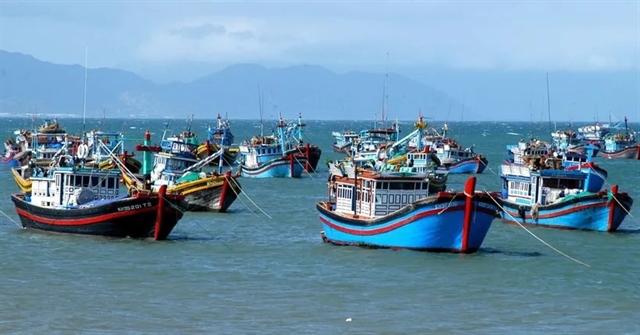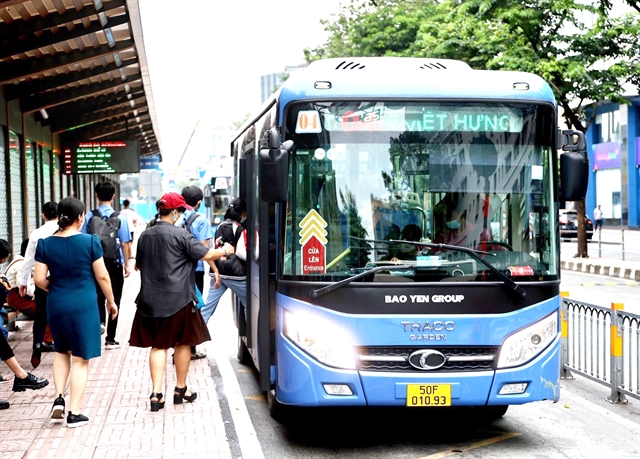 Society
Society

 |
| Passengers board a bus on Hàm Nghi Street, District 1 in HCM City. — VNA/VNS Photo Hồng Đạt |
HÀ NỘI — Five bus routes in Hà Nội operated by Bắc Hà Ltd. Co., specifically routes 41 to 45, will be taken over by three separate transport companies, while numerous bus operators in HCM City are reporting losses due to the low number of customers.
Experts believe that to become more attractive to commuters, bus companies need to improve their service quality.
Nguyễn Văn Thanh, former chairman of Việt Nam Automobile Transportation Association, observed that there are multiple challenges in public bus operation in major cities, especially Hà Nội and HCM City.
The situation has been worsening with the COVID-19 pandemic and the recent fuel price surges.
People are turning their back on city buses, Thanh said, with many losing the habit of using this means of transportation after the pandemic.
A representative from Hà Nội Transportation Service Corporation (Transerco) said the company faced tremendous hardships in the first half of this year, citing reduced bus schedules compared to the original contract, changes in customers’ transportation needs and habits, and traffic congestion during rush hours.
This resulted in a decrease of more than 40 per cent in the fare revenue.
“The fewer the customers, the less the subsidy for bus operators." he said.
"There will be even more obstacles in replacing old vehicles, investing in the infrastructure, and paying salaries.”
The reasons behind this downturn have been the subject of debate over recent months, the most talked about being outdated and degrading vehicles, unprofessional staff, the lack of financial resources, poor customer services, inconvenient locations of bus stops, and long intervals.
Dr Nguyễn Sĩ Dũng, former vice chairman of the National Assembly Office, shared the same perspectives that public bus transport needs improvement.
It is necessary to consider renovating and building a logical plan to improve the quality of the public bus system, he said.
The market mechanism should also be applied in this process, with selected, capable service providers.
Statistics revealed that each year, while thousands of billions of đồng are spent to subsidise public bus operations, bus service providers are still reporting losses.
In 2003, HCM City took out VNĐ98.2 billion (approx. US$6.3 million at the time) as subsidy for the city buses, and this figure has been increased through the years.
The city’s subsidies for public buses was VNĐ1 trillion in 2018, VNĐ1.2 trillion in 2019, and VNĐ900 billion ($38.6 million) in 2021.
Meanwhile in Hà Nội, according to the city’s Public Transport Management Centre, there were 104 bus routes with a total of 1,660 vehicles in 2019 and VNĐ1.8 quadrillion ($77.3 billion) in subsidy.
In 2020, these figures are respectively 104 bus routes and 1,678 vehicles, with a subsidy of over VNĐ1.6 quadrillion.
Many are raising the question on whether the subsidies should be continued, as these are huge amounts yet the effectiveness is below expectation.
Speaking on the matter, Dr Dũng said that this is a public service, and therefore subsidy is a must. However, the focus should be put on a better experience for passengers.
Đào Viết Ánh, director of Phương Trang bus company - an operator well-known for its efficiency, said that when participating in the bidding for any bus routes, businesses will know about the subsidy rates.
After receiving this information, businesses are responsible for researching and calculating all the costs to determine the feasibility.
Therefore, when they decide to join the bid and make a contract with a fixed subsidy rate, it is not possible to use losses as an excuse to stop the operation on a particular bus route, he said.
Ánh added that there are two main reasons behind poor services: operators’ negligence in social responsibility in the chase after profit, and incohesive measures to improve the bus system in several cities and provinces.
Ánh said: “Localities need to re-examine their own plan for bus services and create a legal framework for investment from businesses.
“It is a must to study people’s transportation needs to organise biddings to attract transport enterprises.
“For underperforming bus routes, operators must be required to improve on their quality with a deadline, otherwise they should be replaced with more capable service providers.” — VNS




